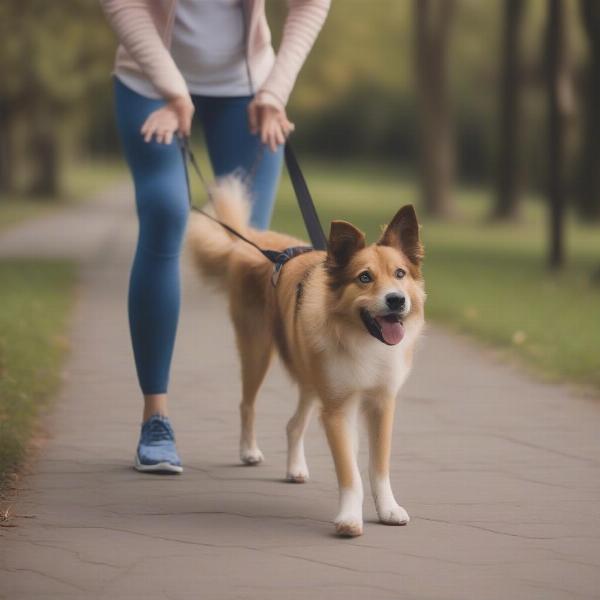Dog walker joints can take a beating, especially if you’re a professional dog walker or simply enjoy long walks with your furry friend. Understanding how to protect your own joints and recognizing signs of joint pain in the dogs you walk is crucial for ensuring everyone stays happy and healthy on the trails. This article will explore common joint issues in dogs, offer tips for preventing joint pain in both you and your canine companions, and suggest ways to manage existing discomfort.
 Dog Walker Joint Pain Prevention
Dog Walker Joint Pain Prevention
Understanding Joint Issues in Dogs
Just like humans, dogs can suffer from various joint problems, including arthritis, hip dysplasia, and ligament injuries. These conditions can cause pain, stiffness, and reduced mobility, making walks less enjoyable. Recognizing the signs of joint pain in dogs is important for early intervention and management. Look out for limping, stiffness, difficulty getting up or down, reluctance to exercise, and swelling or tenderness around the joints.
Protecting Your Own Joints as a Dog Walker
Walking multiple dogs, especially those who pull or lunge, can put significant stress on your own joints. Prioritizing your joint health is essential for a long and fulfilling dog walking career. Start each walk with a proper warm-up, including stretches for your legs, back, and shoulders. Wear supportive and comfortable footwear designed for walking, and consider using a harness for old dogs or double-ended leash to manage multiple dogs effectively and reduce strain on your wrists and elbows.
Preventing and Managing Joint Pain in Dogs
Providing appropriate exercise, maintaining a healthy weight, and ensuring proper nutrition are crucial for preventing joint problems in dogs. Regular, moderate exercise helps strengthen muscles and support joints. Obesity puts extra stress on joints, so maintaining a healthy weight is essential. A balanced diet rich in omega-3 fatty acids and glucosamine can also support joint health.
Nutritional Support for Joint Health
Supplements like glucosamine and chondroitin can help protect cartilage and reduce inflammation in dogs with joint issues. Omega-3 fatty acids also have anti-inflammatory properties and can benefit dogs with arthritis. Always consult with your veterinarian before starting your dog on any supplements.
Assistive Devices for Dogs with Joint Pain
For dogs already experiencing joint pain, various assistive devices can improve their mobility and comfort. A walker for dogs can provide support and stability for dogs with weakened hind legs. Joint supplements, prescribed medications, and physical therapy can also help manage pain and improve function. For senior dogs, ramps can assist with getting in and out of cars and onto furniture.
Conclusion
Protecting dog walker joints requires a proactive approach, focusing on both your own joint health and the joint health of the dogs you walk. By understanding the common causes of joint pain, implementing preventative measures, and utilizing appropriate management strategies, you can ensure enjoyable and pain-free walks for both you and your canine companions.
FAQ
-
What are the common signs of joint pain in dogs? Limping, stiffness, difficulty getting up or down, reluctance to exercise, and swelling or tenderness around the joints are common indicators.
-
What can I do to prevent joint pain in my dog? Maintaining a healthy weight, providing regular moderate exercise, and ensuring a balanced diet are key preventative measures.
-
What are some effective treatments for joint pain in dogs? Joint supplements, prescribed medications, physical therapy, and assistive devices can help manage joint pain and improve mobility.
-
How can I protect my own joints as a dog walker? Warm up before each walk, wear supportive footwear, and use appropriate equipment to manage multiple dogs effectively.
-
Are there any specific breeds prone to joint problems? Large and giant breeds, such as German Shepherds and Labrador Retrievers, are more susceptible to certain joint conditions like hip dysplasia.
-
When should I seek veterinary care for my dog’s joint pain? If you notice any signs of joint pain, consult with your veterinarian for a proper diagnosis and treatment plan.
-
What kind of diet is best for dogs with joint problems? A balanced diet rich in omega-3 fatty acids and glucosamine can support joint health.
ILM Dog is a leading online resource for dog owners and enthusiasts worldwide. We provide expert advice and practical tips on all aspects of dog care, from breed selection and health to training and nutrition. Our goal is to empower dog owners with the knowledge and resources they need to provide the best possible care for their canine companions. Contact us today for any dog-related inquiries. Email: [email protected], Phone: +44 20-3965-8624. Visit ILM Dog for more information.